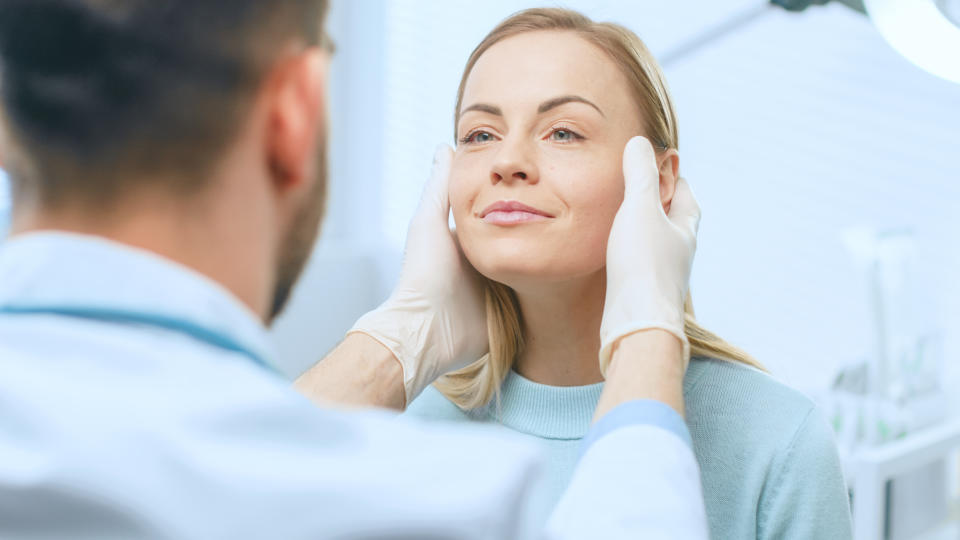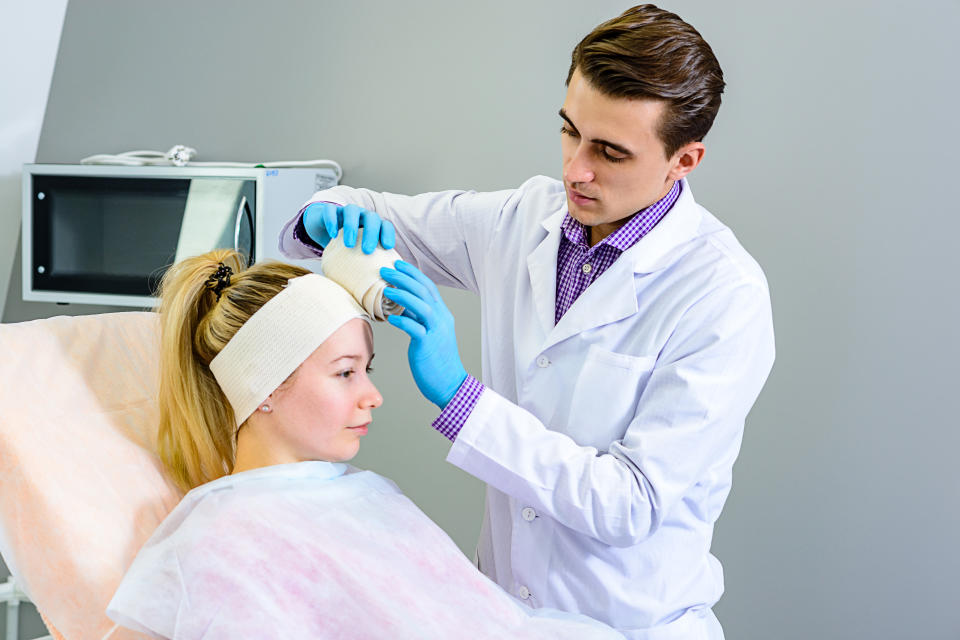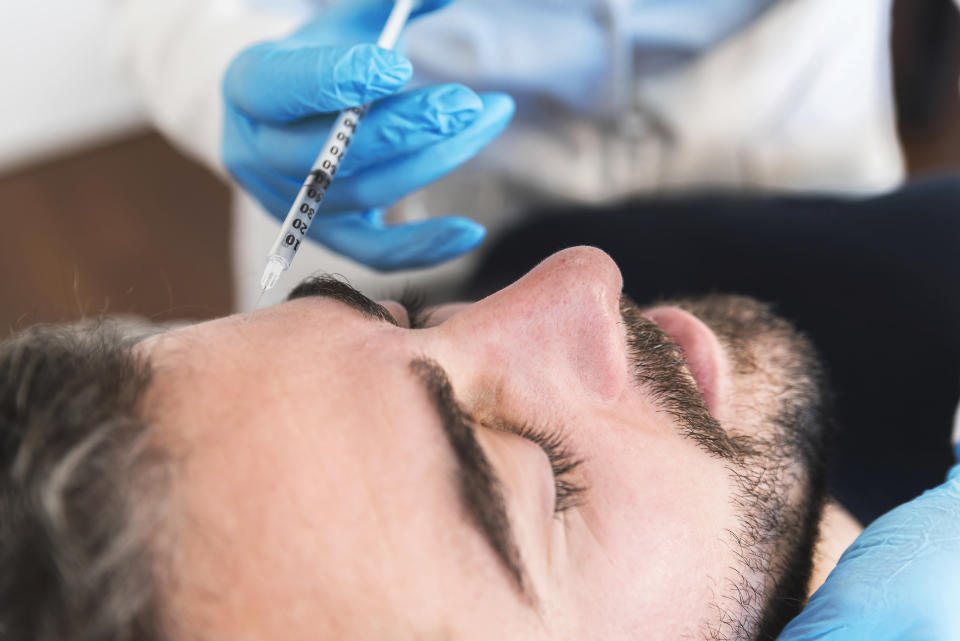Pandemic plastic surgery spike 'surprising' doctors
The COVID-19 outbreak had a swift and brutal impact on the medical and health sphere but now, several months on and with lockdown measures easing across the country (for the most part), the far-reaching and unexpected effects of the virus are beginning to emerge.
Among those was the surprising spike in surgical cosmetic procedures such as boob jobs, tummy tucks and ear pinning that occurred almost immediately after Australian surgeons were given the green light to recommence elective procedures in late July.

Not only that, but surgeons also noticed a demographic shift in terms of the type of patients they were seeing, with an increase in both men and older women going under the knife.
Dr Richard Hamilton, an Adelaide-based plastic surgeon of over 20 years, tells Yahoo Lifestyle that his practice saw a ‘significant’ jump of about 25 per cent in patient enquiries that proceeded to surgery across the board.
According to Dr Hamilton, the post-quarantine nip and tuck boom is largely influenced by one particular aspect of our new COVID era lives.
“Spending more time at home and working from home gives people the opportunity to reflect on themselves and their appearance,” he explains.
“With all these Zoom conferences where you see yourself as well as other people on the screen, you’re looking in the mirror aren’t you, in a way,” he adds.
Whether for work or play, our increased reliance on socially distanced forms of communication such as Facetime and Zoom has forced many of us to face... well, our own faces for possibly the first time in our lives.
RELATED:

Procedure on the rise
Because of this, Dr Hamilton has noticed one procedure that is typically done in younger patients has risen in popularity with an entirely different age group: otoplasty or ear pinning.
“It’s normally done in childhood, around seven or eight-years-old but certainly [I’m seeing more] older patients in their 30s, 40s and beyond. They fit into the category of wanting to have it done but never had the opportunity,” he says.
Recovery is short and post-op bandaging can be hidden under a beanie or hat for video calls, Dr Hamilton adds.
Sydney-based plastic surgeon Dr Eddy Dona tells Yahoo Lifestyle that he was ‘surprised’ by the influx of enquiries that began as far back as April when the majority of the country was still in lockdown.
He’s noted an increase in young women coming in for breast augmentation, which he puts down to COVID’s impact on international travel.
“This time of year a large amount of young adults are over in Europe spending a lot of money but this year and for the foreseeable future, no one can go anywhere,” Dr Dona explains.
“So suddenly these people have a lot of money that they would normally blow on a holiday and they think, ‘I might as well have surgery or an enhancement procedure instead,’” he adds.

But it’s not just women in their 20s looking to put some hard-earned cash towards their appearance — Dr Dona has also seen more women in their 30s and 40s coming in for what he calls a ‘mummy makeover’.
“Busy mothers who were working, juggling a household and not placing a priority on themselves were forced to stop [due to the coronavirus outbreak] and reflect and focus on themselves.
“For the first time in years, many mums now have the time off and the opportunity to dedicate to themselves and they’re coming in for a typical ‘mummy makeover’ which is usually a tummy tuck and a breast enhancement procedure.”
More men getting injectables
Dr Vivek Eranki, a cosmetic surgeon who works in WA, tells Yahoo Lifestyle that while he too has noted an increase in interest across both surgical and non-surgical cosmetic procedures, it’s the latter category that’s really taken him aback.
“Surprisingly for us and many of my colleagues, it’s been the ‘lunchtime procedures’ [that have seen a spike].
“These are the procedures where people come in, have the treatment and walk away for the results. There’s no downtime.
“We’ve seen a lot more people come in for lip, cheek and jaw fillers. In my opinion, this has been pushed by how people are viewing themselves more and more. Many have transitioned from an office to online where they see themselves [on screens] all the time.”
In Dr Eranki’s experience, patients are noticing more ‘irregularities’ about their faces such as asymmetry, deflated lips and dark circles under their eyes.
He’s also spotted a ‘sizeable’ change in the patient demographic in our post-COVID world.
“We’ve also noticed more males coming in; traditionally for us, it’s been about a 95 per cent female and five per cent male split but that’s changed to about an 80/20 split so we’re seeing about four times as many males coming in,” he says.
These men are undergoing similar injectable procedures to their female counterparts but in different areas. According to Dr Eranki, they’re not as concerned about their cheekbones or lips but rather nose shape and dark under-eye circles.

Is it safe to have plastic surgery in a post-COVID world?
Without the demands of ‘normal’ life and an increased desire — or requirement — to limit social interaction and remain at home, the post-COVID period can be seen as an ideal time to recover from major cosmetic surgery.
According to Dr Eranki, the most common reason his patients decide to undergo cosmetic surgery post-COVID is that they’re working from home anyway so can recover while they’re there.
Breast augmentation surgery, for example, has a significant post-op downtime with patients unable to drive, go to the gym or lift heavy items (including children) for a few weeks.
But, is it safe to choose to have surgery at this time?
“It all depends on managing risk. If you’re in Victoria then no, you shouldn’t be having anything non-essential done,” Dr Eranki explains.
“If you’re in NSW then it will depend on where you are located. I’m based in Perth where there’s currently no community spread,” he adds.
At his practice, both he and his staff have completed the required COVID and wear PPE, while patients are screened via questionnaire and have their temperatures taken on arrival — if there’s any doubt, they’re sent to have a test.
Dr Hamilton says that while he thinks that elective surgery is, in general, safe he is not encouraging people to have nose jobs or rhinoplasty at this stage due to the close proximity between the surgeon and the patient’s respiratory system.
Dr Eranki is very mindful of not operating on people who have elderly or immunosuppressed family members that may care for them post-op, and he’s also intensified patient’s pre-op mental health screening.
Dr Hamilton predicts the current boom will be sustained and encourages anyone interested in cosmetic procedures to do their research and closely check doctors’ credentials, in particular, the acronym ‘FRACS’ which means they’re a Fellow of the Royal Australasian College of Surgeons.
Click here to sign up to our daily newsletter to get all the latest news and hacks. Or if you have a story tip, email us at lifestyle.tips@verizonmedia.com.

 Yahoo Finance
Yahoo Finance 


